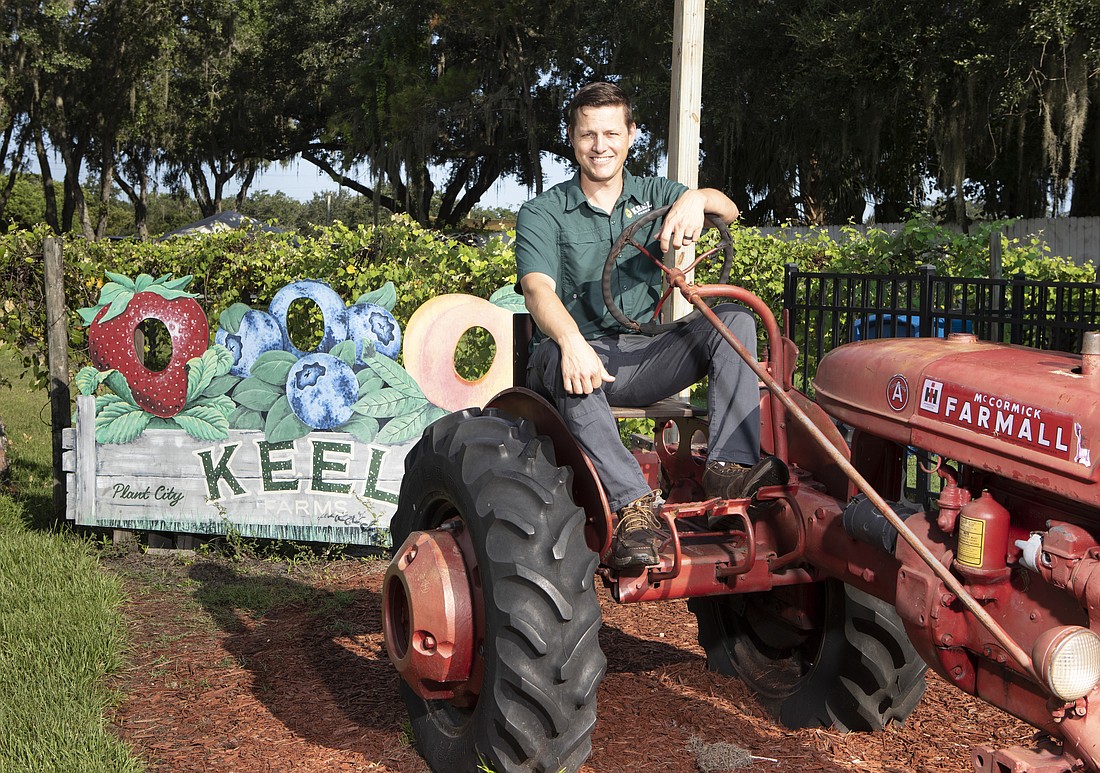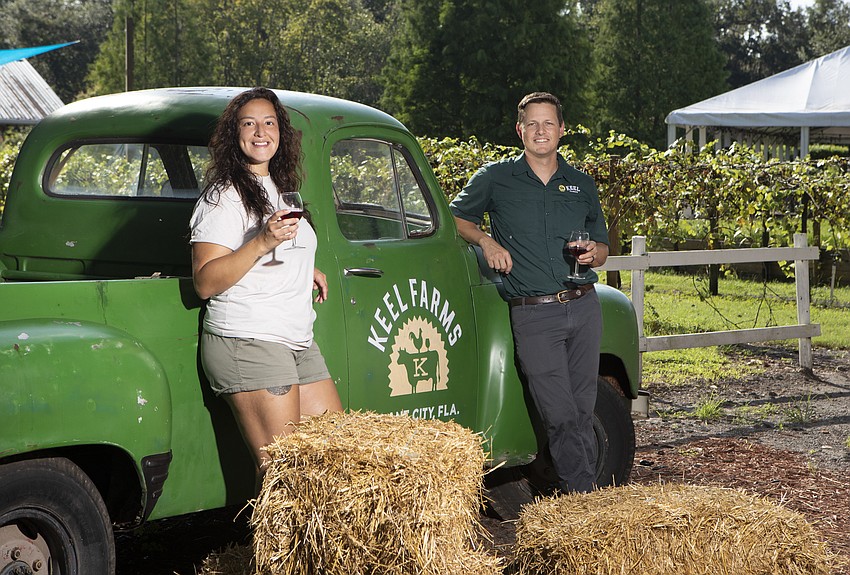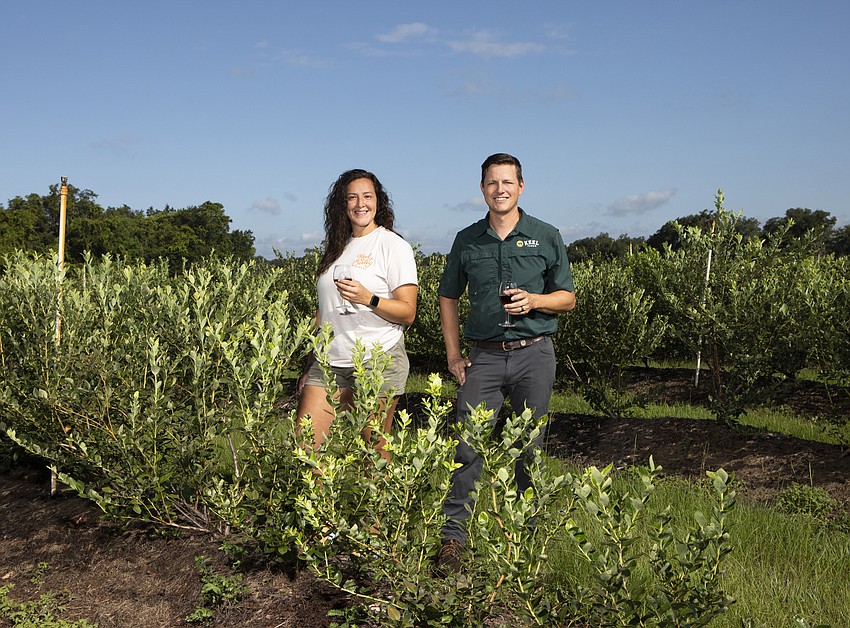- December 13, 2025
-
-
Loading

Loading

Spread across 40 acres on the outskirts of Plant City, just north of Interstate 4, you’ll find one of the hidden gems of the Tampa Bay food and beverage scene: Keel Farms and Keel & Curley Winery, complementary companies founded by blueberry farmer Joe Keel and are now run by his son, Clay Keel, who’s helped transform the family business into a $10 million operation that’s been grown 30% in the past few years.
The Keel brands’ evolution from agricultural business to dining and entertainment hub is a testament to the power of creativity, innovation and what you might call, for lack of a better term, tinkering — and never being totally satisfied and settled in your line of work.
“When I was in college at USF, my father was going through the beginning of this transition,” Clay Keel says. “At that point, it was just an experiment. He was doing millions of dollars in blueberries a year, but then he started experimenting with wine, making it in his kitchen. He started making 100-gallon batches, then 200-gallon batches. But I’ll tell you, it was a very slow transition with a lot of hard work.”
Today, Keel & Curley Winery (Curley is the maiden name of Clay Keel’s mother) ferments wine in 1,000-gallon tanks in a modern, state-of-the-art production facility located just a few yards away from the tasting room, and then bottles, corks and labels the wine on a production line that can produce 1,400 finished bottles of wine per hour. It sells a half-million bottles per year thanks to deals with Publix, Walmart, Winn-Dixie, Total Wine, ABC Liquors and independent liquor stores. The companies have some 150 employees, of which 40 are full-time and the rest are part-timer or seasonal.

Meanwhile, the Keel Farms brand makes and sells small-batch craft beers and ciders, although that side of the business is dwarfed by the wine operation.
“It didn’t start fancy,” Clay Keel says. “It started in an old mobile home that my father turned into a tasting room. He was hand-labeling and using a little corking machine one bottle at a time. He would have five people helping him bottle and they could do maybe 50 cases a day. We do 50 cases in 30 minutes now.”
The term “think outside the box” gets bandied about too much, but that’s exactly what Joe Keel did 20 years ago when he started making blueberry wine. His crop always included plenty of blueberries that can’t be sold as-is in the produce sections of grocery stores, but they were perfectly fine for making juice — and wine. Keel Farms still grows and sells blueberries, but most years, between 30% and 40% of the crop consists of juice-grade blueberries that “aren’t pretty enough for the grocery store,” Clay Keel says. “They’re plenty fine for making wine, so that works out well.”
Today, the Keel & Curley product lineup includes the brand’s signature blueberry wine as well as peach wine, key lime wine, strawberry wine (Keel Farms is also a prolific grower of strawberries), red sangria and wild berry wine. Expanding its offerings, however, presented logistical challenges for the company. Juice had to be brought in from other parts of the country and then blended with the fruit grown on site.
“The cost of logistics — it’s become a lot more expensive to manufacture a product in Florida,” Clay Keel says. “Everybody’s facing that.”
Keel Farms, however, has found ways to overcome that obstacle. To make its cider, the company was having apple juiced shipped from northern states with climates more favorable for growing apples. “We were bringing truckloads of apple juice down here,” says Cody Lentz, the company’s production director. “But now we’ve partnered with an orchard so we can make our products off site, in New York, straight at the source. So, instead of trucking down raw ingredients, we’re trucking down finished goods.”
That partnership has also been beneficial in that it’s allowed Keel Farms to produce greater amounts of cider and switch from 12-ounce to 16-ounce cans.
The other big innovation is the establishment of a new Keel Farms vineyard that will grow muscadine grapes, which are hardier than many traditional wine grapes and can withstand Florida’s intense heat and humidity. The five-acre vineyard will be cultivated on an eight-acre property on Lake Thonotosassa that Keel Farms recently acquired. Located about seven miles from the Keel Farms/Keel & Curley campus, the property also includes a 125-year-old house that overlooks the lake. Clay Keel says the house could be used for retail wine sales but he and his team are still “trying to figure it out.”
Having a full-fledged vineyard, though, will be a big step for the company and allow it to branch out beyond fruit wines.
“We're going to start trying to make some muscadine grape wine,” Clay Keel says. “It's a little more challenging. They’ve got a thick skin — not a great-tasting wine grape — and a lot of seeds, a lot of tannins. So, you have to sweeten the wine pretty heavily to make it taste good. That’s just one of the challenges of being a Florida winery. But it’s not impossible, and we’re happy to do it.”
According to Keel & Curley Winery Hospitality Director Wendy Camacho, the innovative thinking accelerated in 2018, when Clay Keel formally took the reins of the winery and farm from his father, who has since retired and moved to North Carolina.
“He had that vision of, ‘We are going to be a destination, and we are going to be a family-friendly experience,’” she says. “We’re not just a restaurant or a winery; you can spend the whole day here.”

Camacho and her team started marketing heavily on social media while Clay Keel built up the facility’s amenities. In addition to the tasting room and restaurant, the campus now features a petting zoo, of sorts, where kids can interact with goats; a playground; stage for live music; a corn maze during the fall season’s Harvest Days celebration; several outdoor bars; and a massive chicken coop where you can buy fresh eggs for $5 per dozen or $3 per half dozen.
Keel Farms, like it has since its early days as a primarily agricultural business, also offers the ever-popular you-pick blueberry and strawberry promotions. That was one of the features that helped the farm not only endure the challenges of the COVID-19 crisis but endear it to the community.
“During that time, we pivoted hard,” Camacho says. “We were lucky that we were able to stay open as a farm. We have so many acres of blueberries that everyone was able to safely distance from each other, and we made masks available; we had hand sanitizer available. We had eggs; we had fruit; we even had toilet paper! We basically became like a little neighborhood store for people who didn’t feel safe going anywhere else.”
The farm also changed its you-pick pricing during that time, going from a pay-by-weight model to “pay what you can,” Camacho says. “That was awesome to see families come out and just pay what they could. They might have been paying us a couple of dollars to just let the kids do a fun activity out of the house, where they felt safe.”